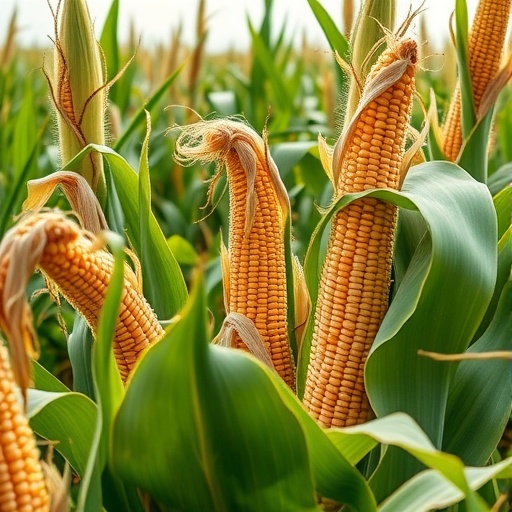In an era where agricultural productivity increasingly relies on data-driven insights, the latest research offers a groundbreaking approach to predicting corn seed yields through enhanced deep neural networks that incorporate interaction features. This innovative study, conducted by researchers Jahan, Amiri, and Nassiri-Mahallati, aims to establish a deeper understanding of the agroecophysiological relationships that govern yield outcomes. The implications of such advanced predictions are profound, promising to transform farming practices and improve food security in the face of global challenges.
At the heart of this research lies the pursuit to optimize corn production—a staple crop that serves as a primary food source around the world. With global population growth escalating, ensuring sufficient crop yield becomes a vital concern for farmers and agronomists alike. The advent of advanced machine learning techniques has opened new avenues to tackle these challenges, and this study leverages these advancements to predict corn yield more accurately than traditional methods.
By employing an enhanced deep neural network, the researchers tapped into the richness of agricultural data, harnessing interaction features that facilitate a more nuanced understanding of various factors influencing yield. This sophisticated model analyzes a multitude of inputs, including soil composition, weather conditions, and agronomic practices, allowing it to uncover intricate patterns that previous models might overlook. The fused capabilities of cutting-edge technology with agricultural science underscore a pivotal shift towards precision farming.
The significance of interaction features in this context cannot be understated. By interlinking data points that may individually influence yields, the model reveals how they collectively contribute to agricultural outcomes. For example, understanding how specific soil nutrients interact with climate variables can lead to more informed decisions about fertilizer applications or crop rotations. Such insights can pave the way for a more sustainable agricultural practice, minimizing waste while maximizing productivity.
This research further emphasizes the importance of agroecophysiological relationships—essentially, the dynamics between the biological and ecological aspects of agriculture. By dissecting these relationships, the researchers are not simply predicting yields but are providing crucial insights into the complex ecosystem that supports corn cultivation. Each nuance identified by the enhanced model represents an opportunity for farmers to adapt their practices to better align with environmental and biological realities.
In the digital age, where big data reigns supreme, the agricultural sector must adapt to maintain competitiveness. This study exemplifies how embracing sophisticated technologies can yield tangible benefits for farmers. By accurately predicting yields, farmers can make more informed decisions regarding resource allocation, planting schedules, and risk management. This proactive approach could significantly reduce losses associated with unforeseen weather events or pest infestations.
Furthermore, as climate change continues to exert pressure on agricultural systems, understanding the interconnectedness of various factors becomes increasingly crucial. The ability to anticipate how environmental changes might impact yield gives farmers a vital tool to adapt their strategies, potentially mitigating the adverse effects of climate-related disruptions. Thus, the implications of this research extend beyond mere predictions; they offer a strategic framework for resilience in an uncertain future.
The researchers’ findings also highlight the need for interdisciplinary collaboration in agricultural research. By merging data science with agronomy and environmental science, they have created a model that not only serves immediate agricultural needs but also contributes to the broader dialogue on sustainable farming practices. The integration of diverse expertise fosters holistic approaches to problem-solving that can benefit the entire agricultural sector.
In terms of practical applications, farmers stand to gain a significant advantage from adopting these predictive models. Precision agriculture is increasingly becoming the norm, and technologies such as GPS-guided equipment and automated irrigation systems depend heavily on accurate yield predictions. This research equips farmers with the knowledge needed to optimize their operations, ensuring that every decision—from planting density to pesticide application—is backed by data.
As the research community continues to explore the potential of machine learning in agriculture, collaborations between tech companies and agricultural institutions could facilitate the development of user-friendly tools for farmers. Making this technology accessible and actionable at the farm level is crucial to translating scientific advances into real-world impact.
The ultimate goal of this type of research is not just higher yields but also sustainable agricultural systems that can support food security in the long term. With the world facing escalating food demand and dwindling resources, innovations like these are not merely beneficial; they are essential.
In conclusion, the profound implications of enhanced predictive models in agriculture are not to be overlooked. As this study demonstrates, the interplay of technology, science, and agriculture holds the key to navigating the complexities of modern farming. The future of agriculture may well depend on leveraging such sophisticated insights to build resilient, productive, and sustainable systems capable of meeting the demands of a growing population.
Ultimately, the combination of deep learning and agricultural practices encapsulated in this research underscores a pivotal evolution in how we approach farming. As farmers embrace these advanced tools, the path toward more efficient, environmentally sustainable farming becomes clearer, and the vision of feeding the world in a changing climate seems more attainable.
Subject of Research: Predicting corn seed yields using enhanced deep neural networks.
Article Title: Enhanced deep neural network with interaction features for corn seed yield prediction: uncovering agroecophysiological relationships.
Article References:
Jahan, M., Amiri, MB. & Nassiri-Mahallati, M. Enhanced deep neural network with interaction features for corn seed yield prediction: uncovering agroecophysiological relationships.
Discov Agric 3, 233 (2025). https://doi.org/10.1007/s44279-025-00408-z
Image Credits: AI Generated
DOI: https://doi.org/10.1007/s44279-025-00408-z
Keywords: Deep learning, corn yield prediction, agroecophysiological relationships, precision agriculture, sustainable farming.
Tags: advanced deep neural networksagricultural productivity insightsagroecophysiological relationshipscorn yield predictiondata-driven farming solutionsenhancing agricultural yield forecastingfood security challengesglobal crop yield improvementinteraction features in modelsmachine learning in agricultureoptimizing corn productionprecision agriculture techniques





